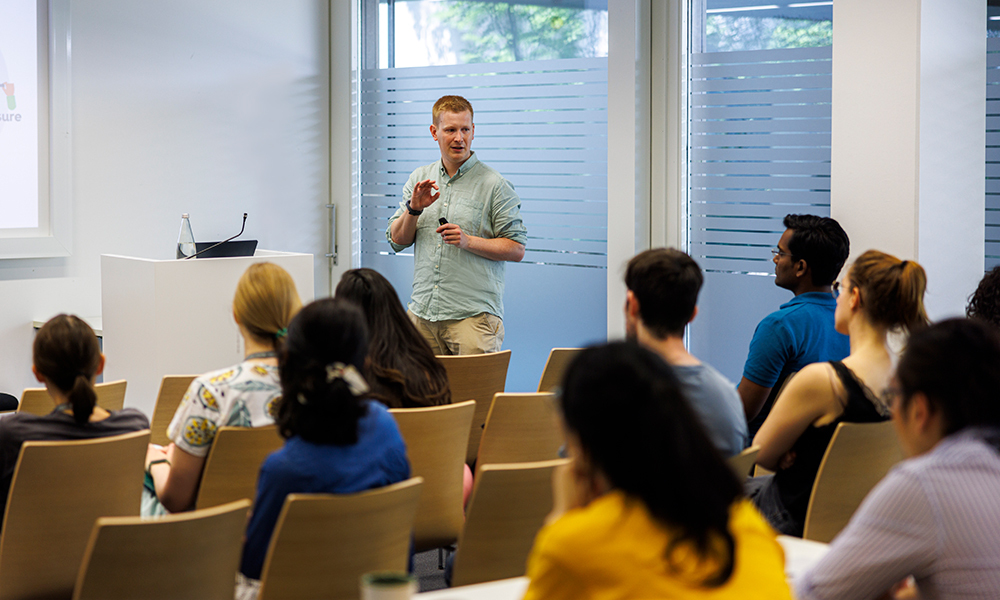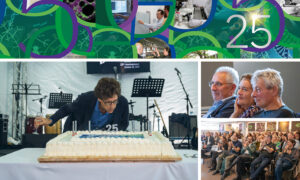
From academia to industry: exploring new career paths
EMBL organised a five-day summer school to help PhD students and postdocs learn more about research and development (R&D) related industry careers

The number of career paths available to PhDs is ever expanding, and the EMBL career service provides the next generation of scientists with the training, mentoring, and support needed to identify and progress in their desired careers. Many EMBL graduates go on to take up successful industry roles involving research and project management. To further facilitate this transition, on 12–16 June 2023, the EMBL Fellows’ Career Service organised its 4th Corporate R&D School.
The programme included talks, interactive exercises, panel discussions, and visits to multiple industry sites. It was attended by 20 selected participants from across EMBL’s six sites in the final years of their PhD or postdoctoral fellowships.
“The workshop was first held in 2018,” said Rachel Coulthard-Graf, Career Advisor at EMBL and primary organiser of the course. “Feedback from the participants suggests that the various iterations have been successful in exposing our fellows to a range of industry R&D careers and increasing their awareness of what is required to succeed in such a role.”
“By providing a wide-ranging overview of research & development in the life science industry, we hope to provide participants with a better understanding of what drives corporate R&D, and where their expertise may fit in,” said Monika Lachner, Head of Internal Scientific Training and Dean of Graduate Studies at EMBL.
Some EMBL alumni who had attended the corporate R&D school as fellows returned to the summer school this year as speakers and panellists. Sander Wuyts, who was a postdoc in EMBL’s Bork Group from 2020–21, fondly remembers cycling up the hill to EMBL Heidelberg and having butterbrezel in the cafeteria afterwards. Directly after leaving EMBL, Wuyts co-founded a startup called ImmuneWatch, which works on enabling T-cell-based diagnostics using machine learning.
“Working at EMBL and learning about all the cool projects that are being executed made me realise that there is so much interesting science being done at research institutes and universities,” said Wuyts. “However, it is often hard to translate this cutting-edge research into real-world applications that, for example, improves patients’ lives or help tackle climate change. That is why I made the decision to work on this interface: translate state-of-the-art science into the wide world.”
The workshop also included a panel discussion with three former EMBL fellows – Philipp Höß (PhD student in the Ries Group, 2016–21), Fabian Merkel (PhD student in the Häring Group, 2016–20), and Vinita Periwal (postdoc in the Patil group, 2016–20), on their present roles in industry.
Periwal is currently a Senior Research Scientist at MARS where she explores the microbiome in-vivo in pets, leading projects from design to execution to delivering results to the stakeholders.
“I participated in the corporate R&D summer school in 2018,” said Periwal. “I used that experience and exposure when I applied for jobs. I was open to applying for different roles where the core work is still research but you can get into different shoes of project management, leadership, budgeting – which I think one also has to do as a PI in academia.”
Similarly, Merkel found his experience at EMBL pivotal in his career journey. “EMBL influenced my career and decisions in multiple ways. Most importantly, my time at EMBL taught me (once again) that science is where my heart is and that I would need to find a scientific position. The position could be in academia or industry but it had to be scientific,” he said. “Further, I feel that the interdisciplinary approach of EMBL is extremely useful for my research now. Even with novel projects, I rarely have to start entirely from scratch because chances are I learned about familiar concepts or topics in a seminar, course, workshop, or conference at EMBL.”
Currently, Merkel works at Merck, Darmstadt, as a scientist within the central analytics department. His lab focuses on bioanalytics and covers different topics revolving around the wider subject of novel modalities (mRNA, plasmids, viral vectors etc.).
As part of the course, the participants visited AbbVie – a pharmaceutical company, BASF – one of Europe’s largest chemical manufacturing companies, which also has a biotechnology research section, and Hummingbird – a company that develops miRNA-based diagnostics. “The site visits were truly enlightening and offered valuable insights into the world of industrial R&D,” said Venkatraman Ravi, postdoc at EMBL Heidelberg and one of the participants of the summer school.
The course was organised jointly by the EMBL Fellows’ Career Service and EMBL Interdisciplinary Postdoc (EIPOD) programme. This programme received funding from the European Union’s Horizon 2020 research and innovation programme under Marie Skłodowska Curie Actions (Grant agreement number 847543).


